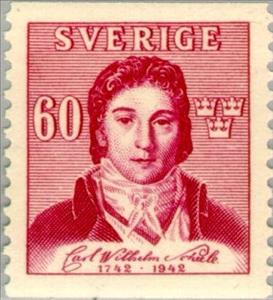Stamp: Scheele, Carl Wilhelm (Sweden 1942)
Scheele, Carl Wilhelm (Sweden 1942)
09 December (Sweden ) within release Scheele, Carl Wilhelm goes into circulation Stamp Scheele, Carl Wilhelm face value 60 Swedish öre
| Stamp Scheele, Carl Wilhelm in catalogues | |
|---|---|
| Michel: | Mi:SE 296 |
Stamp is square format.
Also in the issue Scheele, Carl Wilhelm:
- Stamp - Scheele, Carl Wilhelm face value 5;
- Stamp - Scheele, Carl Wilhelm face value 5;
- Stamp - Scheele, Carl Wilhelm face value 60;
- Stamp - Scheele, Carl Wilhelm face value 5;
- Se-tenant - Scheele, Carl Wilhelm face value 2*5;
- Booklet - Carl Wilhelm Scheele (1742-1786) pharmaceutical chemist face value 20*5;
- Booklet - Carl Wilhelm Scheele (1742-1786) pharmaceutical chemist face value 20*5;
|
Data entry completed
46%
|
|
|---|---|
| Stamp Scheele, Carl Wilhelm in digits | |
| Country: | Sweden |
| Date: | 1942-12-09 |
| Format: | Stamp |
| Face Value: | 60 Swedish öre |
| Print run: | 3078700 |
Stamp Scheele, Carl Wilhelm it reflects the thematic directions:
Famous People refers to the fame and public attention accorded by the mass media to individuals or groups or, occasionally, animals, but is usually applied to the persons or groups of people (celebrity couples, families, etc.) themselves who receive such a status of fame and attention. Celebrity status is often associated with wealth (commonly referred to as fame and fortune), while fame often provides opportunities to make money.
Commemorations are a type of religious observance in the many Churches of the Anglican Communion, including the Church of England. They are the least significant type of observance, the others being Principal Feasts, Principal Holy Days, Festivals, and Lesser Festivals. Whereas Principal Feasts must be celebrated, it is not obligatory to observe Commemorations. They are always attached to a calendar date, and are not observed if they fall on a Sunday, in Holy Week, or in Easter Week. In Common Worship Commemorations are not provided with collects or indications of liturgical colour. However, they may be celebrated as Lesser Festivals if local pastoral conditions suggest it.
An invention is a unique or novel device, method, composition, idea, or process. An invention may be an improvement upon a machine, product, or process for increasing efficiency or lowering cost. It may also be an entirely new concept. If an idea is unique enough either as a stand-alone invention or as a significant improvement over the work of others, it can be patented. A patent, if granted, gives the inventor a proprietary interest in the patent over a specific period of time, which can be licensed for financial gain.
A chemist (from Greek chēm(ía) alchemy; replacing chymist from Medieval Latin alchemist)[1] is a graduated scientist trained in the study of chemistry, or an officially enrolled student in the relevant field. Chemists study the composition of matter and its properties. Chemists carefully describe the properties they study in terms of quantities, with detail on the level of molecules and their component atoms. Chemists carefully measure substance proportions, chemical reaction rates, and other chemical properties. In Commonwealth English, pharmacists are often called chemists.



